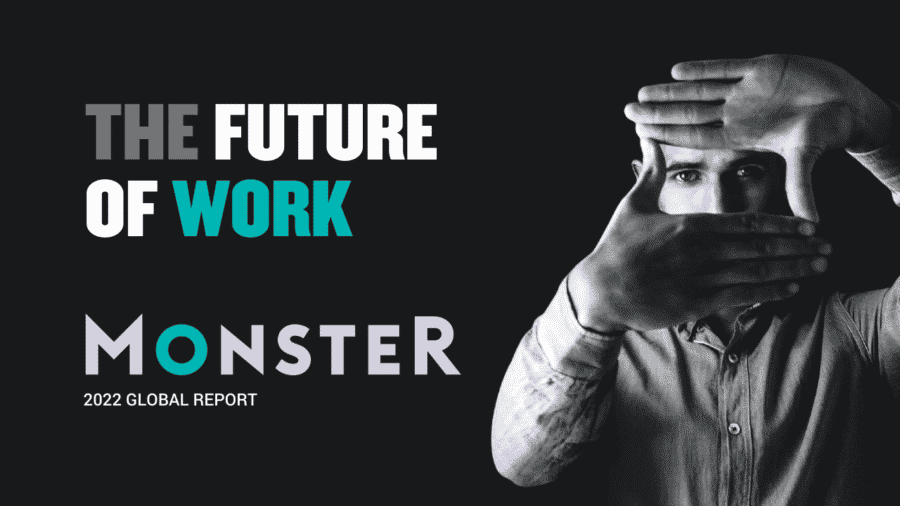Though we all wished we’d be in a post-pandemic frame of mind starting off 2022, we’re not quite there yet. However, despite economic stops and starts, there are hints of optimism and hope for increased hiring and a new and improved work environment… that is if global employers and job seekers can get on the same page.
Those were some of the key themes to come out of Monster’s just-released Global Future of Work 2022 Report. The results of the report’s two global surveys of both recruiters and workers also revealed that employers are facing an extremely competitive talent environment. But despite the ongoing pandemic challenges, employers are poised to forge forward with larger staffs and new ways of working. They’ll be working within a much more competitive marketplace and may have to spend more money to attract talent, however.
Here are some key takeaways from the report that reveal what the coming year may have in store for hiring managers, staffing agencies, and recruiters.
Hiring Needs Are up, but Talent Is Harder to Come By.
The 2022 hiring outlook is much improved from last year! In fact, 93% of employers plan to hire this year – including 52% to replace or backfill staff, and 41% who plan to hire for new positions. The problem is that thanks to fewer active job seekers and a persistent skills gap, good talent is getting harder to find – and costing more to attract. Hence why just 43% of global recruiters call themselves “very confident” that they will be able to find the right fit candidates for open positions.
>> Regional standout: Germany leads the way in thinking the skills gap is worse than a year ago (35%).
Job Seekers Want Money and Purpose.
Candidate priorities are shifting away from flexibility and towards higher pay and career satisfaction, according to FOW Report. Interestingly, 42% of respondents listed meaningful work as one of the most important factors driving career choice – above flexible work schedules. Also on the rise is a desire for skills training and career development. With 33% of candidates also saying they are seeking a caring work environment, employers have an opportunity to reach prospective hires by emphasizing workplace culture.
>> Regional standout: Among French employers, 1/3 plan to offer salary protection (vs. 26% globally) to attract candidates.
Recruiters Must Get Creative to Source Talent.
You’ll want to get on board with recruiting candidates from new or unexpected sources. Some avenues to try: 67% of Gen Z recruiters globally told us they are increasing outreach to outside organizations with diverse talent pipelines, while 63% of recruiters said they’d be open to hiring candidates with transferable skills that they can train. Others are experimenting with new recruitment strategies including:
- 24% are increasing job ads
- 21% are expanding their location search
- 31% are increasing outreach to organizations with diverse talent pipelines
>> Regional standouts: Canada has the highest percentage of its recruiters relying on job board postings for their last few hires (37% vs. 29% globally). And employers in the UK and France are most willing to train those with transferable skills (70%).
The Future of Recruiting Is More Digital.
Gen Z and Millennial recruiters – who make up a majority of today’s active recruiters – embrace texting, and are also more likely to leverage a broader set of tools that includes job board matches, email campaigns, social ads, and more. In fact, 61% of global Gen Z recruiters think virtual recruiting is better than in-person (vs. 26% of millennials and 6% of Boomers who said the same).
>> Regional standout: North America has a slightly higher percentage of recruiters who want to communicate with candidates via text than the EU (35% vs. 32%).
There’s No Consensus on Return-to-work Plans.
Globally, 43% of employers say hybrid work schedules are the way of the future, but 27% of employers have plans to return to fully on-site work while 16% are staying full-remote.
>> Regional standouts: Italian employers are the most likely to go hybrid (63%), while Sweden had the highest percentage planning go fully remote (37%), and the Netherlands had the highest expectations to return to on-site work (34%).
DEI Policies Are No Longer Wishlist Items – They’re Being Implemented.
About 35% of global employers cited the need to build a diverse workforce as their top DEI priority for 2022. This aligns with 39% of younger candidates (ages 18-24) ranked an employer’s DEI initiatives, gender pay equity, and proactive response to social issues as becoming increasingly more important.
>> Regional standout: The UK (27%) leads the way for LGBTQIA+ programs compared to 24% globally.
So what does all of this mean for recruiters in this new year? It’s more important than ever to try new approaches while getting to the heart of what candidates and employees want. This will not only help you attract right-fit talent, but also create a work environment that allows them to do their best work.
For more insights into how recruiters and candidates feel about the Future of Work, the hiring outlook, and more, download the full report from Monster.
